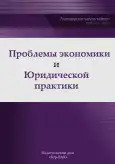Вызовы развития человеческого капитала России в условиях экономики знаний
- Авторы: Причина О.С.1, Орехов В.Д.2, Блинникова А.В.3
-
Учреждения:
- Университет «Синергия»
- Международный институт менеджмента ЛИНК
- Государственный университет управления
- Выпуск: Том 19, № 4 (2023)
- Страницы: 177-185
- Раздел: Региональная и отраслевая экономика
- URL: https://journal-vniispk.ru/2541-8025/article/view/145619
- EDN: https://elibrary.ru/UOAVGM
- ID: 145619
Цитировать
Аннотация
Целью исследования является выявление и анализ эмпирически конкретных вызовов, которые возникают по отношению к оптимальному функционированию человеческого капитала России, а также уровень принятия этих вызовов обществом и переформатирования в ключевые стратегические цели. Использован эмпирический метод проблемного структурирования в логически рациональной форме, включающий в себя 12 прогностических этапов. Кризис рождаемости породил грандиозный социальный вызов с возможностью как благоприятного, так и неблагоприятного сценария для конкретного общества и его человеческого капитала. Благоприятный сценарий предусматривает создание системы управления демографическими процессами. Однако данный вызов пока не принят в полной мере большинством стран мира, включая Россию. Одной из причин непринятия данного социального вызова является относительно медленный начальный темп депопуляции России—на 2% за 30 лет, с 1993 года. Второй вызов в сфере развития человеческого капитала связан с системой образования и заключается в том, что Россия столкнулась с барьером роста доли населения, получившей третичное образование (высшее и среднее профессиональное). Это позволило крупным развитым странам приблизиться по этому показателю к уровню России—около 57%. К числу причин образовательного барьера относятся неопределенность с парадигмой образования (научная или профессиональная) и неоднозначные стратегические образовательные цели (приоритет доступности в ущерб качеству и неопределенность запросов различных ключевых потребителей). Сильное влияние доступа к знаниям на эффективность деятельности человеческого капитала порождает, применительно к России, вызов доступа ЧК к достаточному количеству знаний. Этот вызов формируется межстрановыми барьерами и недостатками организации информационных потоков внутри России. На принятие вызовов развития человеческого капитала нацелены национальные проекты России: «Демография», «Здравоохранение» и «Образование», что отражает поворот общества к пониманию важности этих вызовов.
Полный текст
Открыть статью на сайте журналаОб авторах
Ольга Сергеевна Причина
Университет «Синергия»
Автор, ответственный за переписку.
Email: olgaprichina@mail.ru
ORCID iD: 0000-0002-3069-3755
доктор экономических наук, профессор, профессор кафедры экономической теории и мировой экономики
Россия, г. МоскваВиктор Дмитриевич Орехов
Международный институт менеджмента ЛИНК
Email: vorehov@yandex.ru
ORCID iD: 0000-0002-5970-207X
кандидат технических наук, директор научно-образовательного центра
Россия, г. ЖуковскийАлла Викторовна Блинникова
Государственный университет управления
Email: allarest@mail.ru
ORCID iD: 0000-0003-4561-8894
кандидат экономических наук, доцент
Россия, г. МоскваСписок литературы
- Belbin R.M. Management Teams. Why They Succeed or Fail. 2004. Second edition. London, Elsevier. 238 p.
- Garvin D. Managing Quality. New York, 1988. Ch. 3.
- Hines A. (2019) Getting Ready for a Post-Work Future. Foresight and STI Governance, vol. 13, no 1, pp. 19–30. doi: 10.17323/2500-2597.2019.1.19.30.
- Nonaka I. (2008) The Knowledge-Creating Company. Harvard Business Review Press.
- Авдеева И. Л. Методология стратегического управления изменениями в контексте современных вызовов и возможностей экономики // Среднерусский вестник общественных наук. 2022. —Том 17. —№ 1. —С.186–201. doi: 10.22394/2071-2367-2022-17-1-186-200.
- Браун Сильвия. Управление человеческими ресурсами. Курс Открытого университета Великобритании «Управление ресурсами в условиях рынка», кн. 3. —МЦДО ЛИНК, 1995.
- Вишневский А.Г. Демоскоп Weekly, № 267–268, 2006. URL: http://www.demoscope.ru/weekly/2006/0267/tema01.php.
- Карасев О.И., Муканина Е.И., Тростьянский С.С., Белошицкий А.В. Концепция «больших вызовов» в системе прогнозирования развития науки, технологий и инноваций // Экономический анализ: теория и практика. —2019. —Т. 18, № 7. —С. 1196–1212.
- Корчагин Ю.А. Российский человеческий капитал: фактор развития или деградации?: Моногр. —Воронеж, 2005. —С. 27.
- Орехов В.Д., Каранышев А.Х., Головчанов С.С. Исследование эффективности командной работы в сфере НИОКР: резервы роста человеческого капитала. Московский экономический журнал. № 9, 2021.
- Поздняков А.С. Общие основы педагогики: тезисы лекций. Учебное пособие. —Саратов: ИЦ «Наука», 2009. 68 с.
- Приходько В. В. Понятие «Образование человека». Труды исследовательского центра проблем качества подготовки специалистов, «Проблемы психологии образования». —Москва, 1992.
- Причина О. С., Орехов В. Д., Причина Д. Ю. Трансформация человеческого капитала регионов России // Проблемы экономики и юридической практики. 2022. Т. № 6. С. 195–206.
- Причина О.С., Орехов В.Д., Морога Д.Ф. Вспомогательные репродуктивные технологии как инструмент демографического и социального развития России. Проблемы экономики и юридической практики. —Юр-ВАК. 2023. Т. 19. №1. —С. 268–274.
- Тхагапсоев Х.Г., Сапунов М.Б. Российская образовательная реальность и ее превращенные формы. // Высшее образование в России. № 6, 2016. С. 87–97.
- Фишер С., Дорнбуш Р., Шмалензи Р. Экономическая теория. М., Юнити, 2002.
- Яковлева С.И. Угрозы, вызовы, риски и проблемы как важные категории стратегического планирования регионов. Экономика и управление. Псковский регионологический журнал № 3 (31), 2017.










